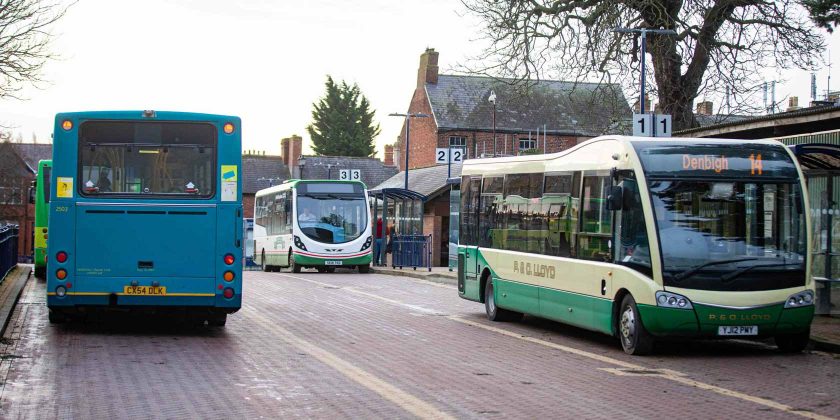Welsh Government extend Bus Emergency Scheme and ‘successor arrangements’ for the whole financial year

Welsh Government have pointed to lack of funds and changing demand models on bus services in Wales, as the Deputy Minister told colleagues there were ‘no quick fixes’ to solve issues, and it was ‘just tough stuff’.
The ‘Bus Emergency Scheme’ was brought in by Welsh Government during the pandemic to protect the bus transport system, and has been extended since to give ‘stability’ to services.
The extension announcement came as Deputy Minister for Climate Change Lee Waters gave a lengthy verbal update in the Senedd on bus services in Wales, “Simply put, COVID blew up an already brittle business model. In the face of sustained reductions in passenger numbers, we’ve had to provide significant additional support to keep services running, and this has prevented mass cancellations of services and kept communities connected. Since the start of the pandemic, we’ve invested over £150 million to keep the bus services running over and above our pre-COVID levels of investment. And our actions have saved an industry, and went over and above action taken by the UK Government. Whilst England lost 9.5 per cent of its bus services last year, in Wales that figure was 2.4 per cent because of our actions.
Waters noted that the number of people using buses has still not returned to pre-COVID levels, “This inevitably has left a large gap in the finances of bus companies in Wales. This external shock has shown the hollowness of the privatised model of deregulation. Although they provide a public good, bus firms are private companies, but who are now operating in a market without enough customers to make them profitable. During COVID, we had emergency funding we could access to get us through the crisis, but that has now all been spent.”
With a recent White Paper setting out the possible future of bus services, including a ‘one network, one timetable, all accessed by one ticket’ system, the Deputy Minister spoke about the gap between now and those plans actually becoming real, “I am very grateful to representatives of local government, the bus industry and Transport for Wales for working really closely together with us to find a way through our short-term challenges. As a result of our joint working, we’ve agreed to extend the existing bus emergency scheme until the end of the school year in July to avoid any disruption to students in the run-up to exams.
“We’ve also agreed to set up regional planning teams supported by Transport for Wales to work with bus companies to establish which services would be viable without additional financial aid, and what routes are the priority for the funding that we are able to make available.
He added, “We have nearly reached a solution that will allow us to make further funding available to protect as much of the network as we can for the remainder of this financial year. This needs to be a more sustainable solution, with a network that reflects changing travel patterns and helps us make the transition to franchising. The Welsh Government will make £46 million available from bus budgets to support BES and successor arrangements for the whole financial year, as well as to keep our strategic TrawsCymru services running. This is in addition to the £45 million we are forecasting spending on concessionary fares for older people, and reduced fares for young people, and our other regular support for the bus industry, including the £25 million bus services support grant, and all the funding we indirectly invest in the industry through local authorities, particularly for school transport. Home-to-school transport makes up around a quarter of all local authority direct spending on education. That figure is now around £137 million a year, and we need to do more to consider school transport as part of the overall public transport system.”
Speaking about operators meeting inflation based pressures he added, “We have agreed to uplift the amount we reimburse operators for concessionary journeys by 10.1 per cent, to reflect their increased costs. We have taken these steps as the result of strong joint working. We have been meeting regularly and working intensively to try and find solutions. Further urgent work is needed with the regional teams and operators to consider how far we can make this funding go. The emergency funding has been a lifeline, but it’s had the impact of preserving a pattern of services that existed before the lockdowns. Travel behaviour has now changed; there are fewer people using buses and trains, and the times of day they are using them has also changed. There are fewer commuting journeys and more leisure journeys. We therefore do not want to keep a pattern of services running that no longer reflects demand or need.”
Natasha Asghar MS led the response to the statement, “However, the sad reality is that this essential form of public transport has been facing drastic cuts as a result of the impending cut to the bus emergency scheme.
Asghar added, “The Confederation of Passenger Transport recently set out their three calls to the Welsh Government, and I wholeheartedly say that I support all three of them. They estimate that the major cuts to the current bus network could be avoided if the Welsh Government delivers an extra £30 million investment between July this year, when the BES ends, and the end of the financial year. So, as I said earlier, we really do welcome this extra funding, as it will also buy the Welsh Government time to work with the industry”
Assurances were also sought that “services might in fact be rolled back after the financial year is over, as opposed to going forward”.
Waters replied, “She says she supports spending an additional £30 million. I’ve just announced that we’ll be putting an extra £20 million on the table. There remains a gap. We don’t have the exact figures yet, and that’s what we’re working through. These are very complicated things to disentangle, because the money that’s given to local authorities to fund concessionary fares is done in arrears when we know the actual spend that’s taken place and we aren’t able to reconcile those figures in real time.”
Delyth Jewell MS noted, “Communities need these bus routes, and bus routes that suit them, not ones that suit the timetables of big companies, because we can’t keep getting to this situation of stepping back from a cliff edge every 12 months, every 18 months; it’s not something I know that you would want either”.
The Deputy Minister replied, “What we’ve been doing with the local authorities, through these regional scrums, as we’ve been calling them, is to identify what are the priority routes. We particularly want to make sure that, when schools return in September, there are school buses there for them, so that they are able to continue without interruptions—that has beeen a key focus of our planning work—but also, the socially necessary routes.
“Local authorities have a duty of their own to support socially necessary routes, but a number of them don’t put any funding in themselves. Some do; RCT, for example, does, and others have chosen not to. So, there’s a patchwork of arrangements. That’s why I think going to franchising creates a far more uniform pattern that we can have the same degree of consistency across Wales on”
“Demand for concessionary fares is about 60 per cent of where it was, so we were able to move that money across. That’s the rough £20 million I mentioned, to go on top of the £18 million that was already in the budget, as well as, then, support for TrawsCymru and the inflationary uplift for concessionary fares. Taken together, that’s where the £46 million comes from. As was mentioned earlier, it falls short of the figure that local authorities and the industry think is required to preserve every single service, as is now. That would require somewhere between £7 million and £9 million; we’re not certain. We simply don’t have that money, and that’s very frustrating. Clearly it’s not a position any of us would want to be in, but we’ve all made decisions about budget priorities, and we’ve decided to prioritise a number of other pressures that we think are important”
Spotted something? Got a story? Email [email protected]












